Overview
- Pop culture as a reproduction.
- Pop culture as an agent.
- The negative effect of popular culture.
- The positive effect of popular culture.
- Conclusion.
Popular culture surrounds us everywhere: on television, in our computers and phones, in our homes and outside. It has several functions and a vast potential to unite and divide people. This presentation aims at showing how pop culture, depending on the approach to its definition, influences social change across cultures and how it is connected to it.
First, we are going to define the concept of pop culture and talk about different approaches to this phenomenon. Then the presentation will discuss how pop culture challenges intercultural communication. Finally, it will dwell on several issues that popular culture might help solving. In the end, the conclusions will be drawn and references provided.
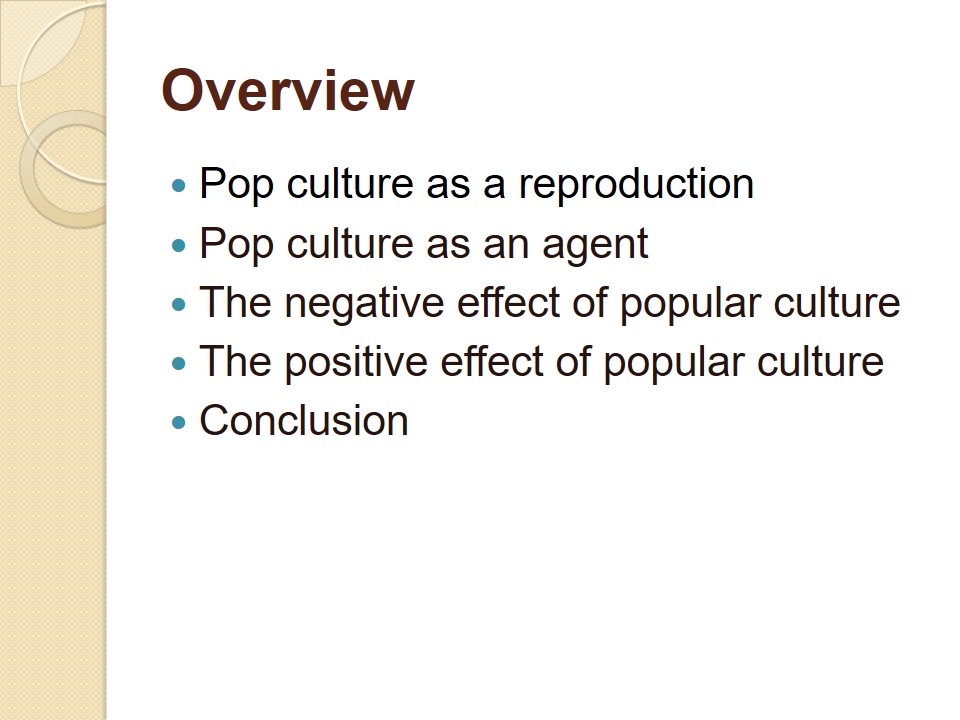
Pop Culture as a Reproduction
- Accepted messages, knowledge, and practices.
- Represent popular values, attitudes, beliefs.
When we think about popular culture, most of us think about film, television, music, video games, books that people consume every day. Indeed, these are examples of pop culture. However, if we try to define pop culture beyond listing specific products, we can use the definition given in the handbook. It says: “Pop culture is a collection of widely accepted messages, knowledge, and practices that represent current popular values, attitudes, and beliefs” (McLean, 2018, p. 336). In this light, popular culture is seen as a commodity and a set of clichés that serves as a reproduction of societal opinions. The media sell only those messages that are widely accepted and make the division between people even wider. This means that casting Scarlet Johansson to portray a Japanese character is normal and acceptable.
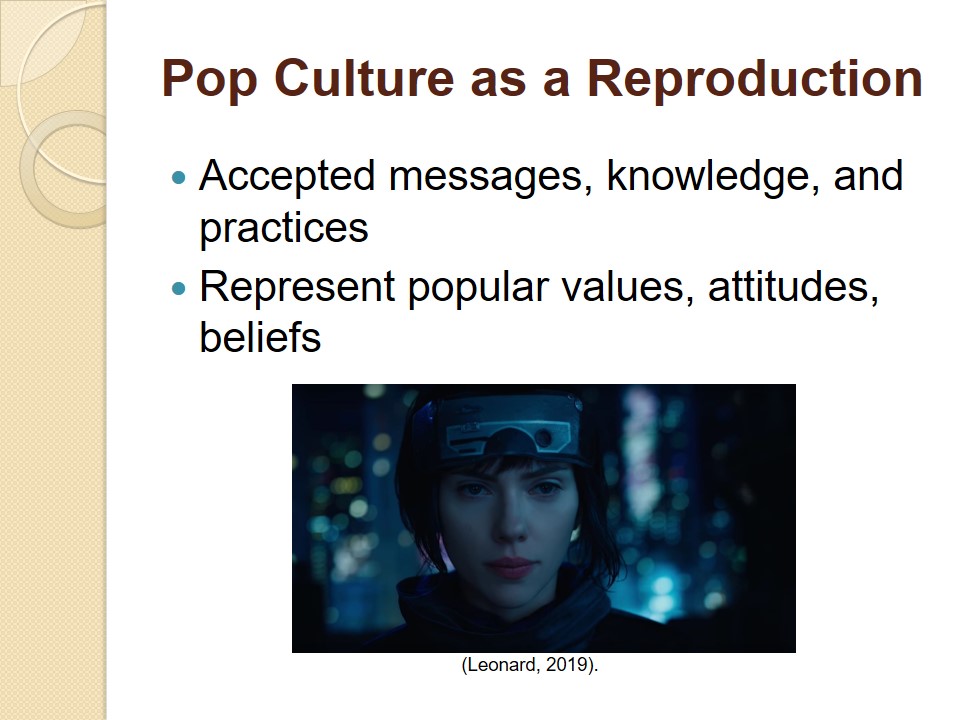
Pop Culture as an Agent
- New messages, knowledge, and practices.
- Defines values, attitudes, beliefs.
The different approach to popular culture can be embraced if we look at it as an agent and a way towards significant social changes. Thus, pop culture does not only reflect values and opinions, it can also define them. Popular culture has “the potential to be a powerful agent for change” and can improve public opinion and behaviour toward stigmatized groups (Godsil, MacFarlane, & Sheppard, 2016, p. 3). Therefore, popular culture can play a key role in establishing successful personal and intercultural communication by defining attitudes towards different races, ethnicities, and other cultural groups of people. This issue becomes even more apparent if we look at the possible negative and positive impact of popular culture on cultural perceptions and follow-up communication.
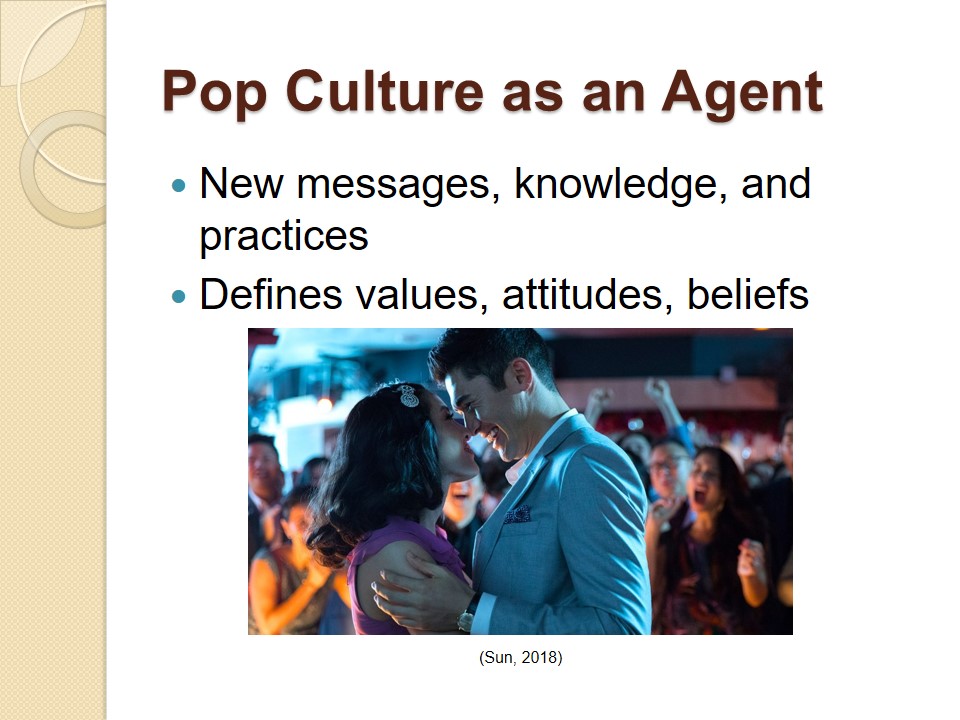
The Negative Impact of Popular Culture
- Stereotyping and misrepresentation.
- Discrimination.
- Cultural appropriation.
The choice to look at popular culture as reproduction of accepted beliefs, attitudes and values leads to the actual reproduction of these views. The following effect is multifaceted and it results in inevitable cases of stereotyping, misrepresentation, discrimination, and cultural appropriation. Casting black people as best friends of white protagonists, positioning Asians as good in maths, sexualizing Latino characters define the attitudes toward these groups. It is also applicable to representatives of particular countries: stereotypical portrayals of Russians as evil warmongers since the Cold War times do not improve the understanding between different cultures. On the contrary, in this case, popular culture creates tension, deepens misunderstanding and prevents individuals from learning.
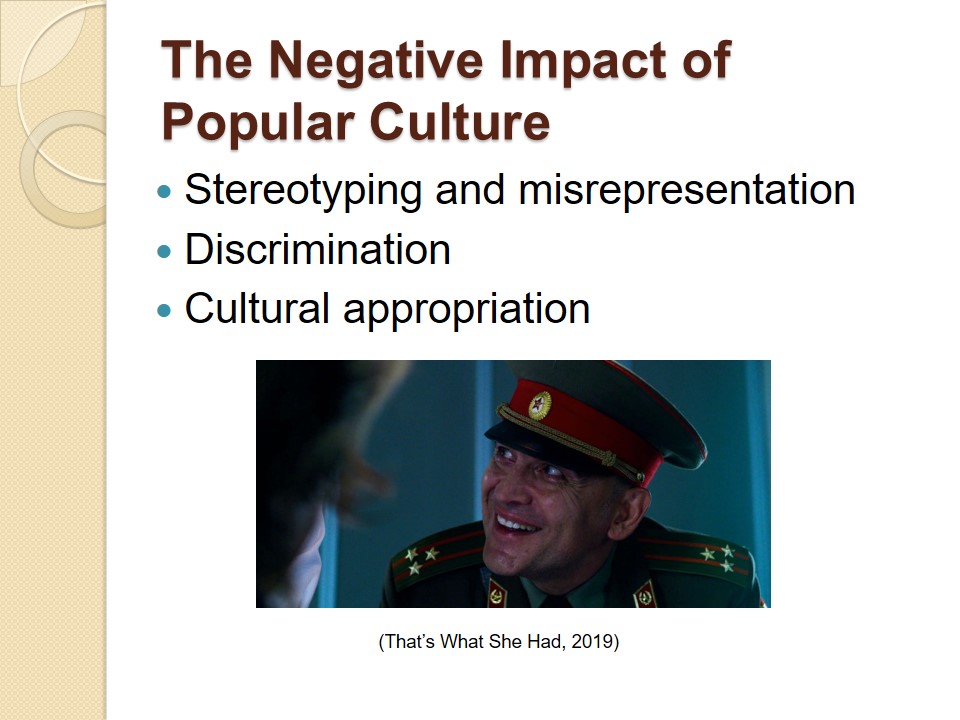
The Positive Impact of Popular Culture
- Education and awareness,
- Battling stereotypes and shaping the civic imagination.
Popular culture, however, can be not only a source of discrimination, cultural appropriation or lack of representation. If approached as an agent of social change, it can be a tool of education and a method of “shaping the civic imagination of people involved in political struggles and social movements around the world (Jenkins, Peters-Lazaro, & Shrestrova, 2020, p. 3). Thus, it has a potential of improving intercultural communication resulting in a better understanding among people.
As for education, pop culture has a chance of telling people about different cultures and raise their awareness. For instance, the recent study showed that in Australia, fans of Japanese and Korean pop culture rendered themselves more cosmopolitan, knowledgeable about Asia, having awareness of inter-Asian difference, and generally have higher cultural literacy (Baudinette, 2020).
Moreover, pop culture had seen many examples when artists and creators used it to tell the world about different issues, including those that define successful intercultural communication. By battling stereotypes and commenting on the issues associated with a particular race or country, pop culture offers its consumers a new perspective.
One example comes from a Netflix show “Master of None”, where Aziz Ansari’s character is coming for an audition for the role of a taxi driver but asked to talk with a particular Indian accent. The show itself comments on the pop culture’s stereotype when “other ethnicities and races emerge as comedic exaggerations” and offers another representation of an Indian young man: not a cab driver, a man at a convenience store, scientist, or IT guy (Retis & Tsagarouisianou, 2019, p. 231). In addition, the most recent example is Beyonce’s Black is King that celebrates black awareness.
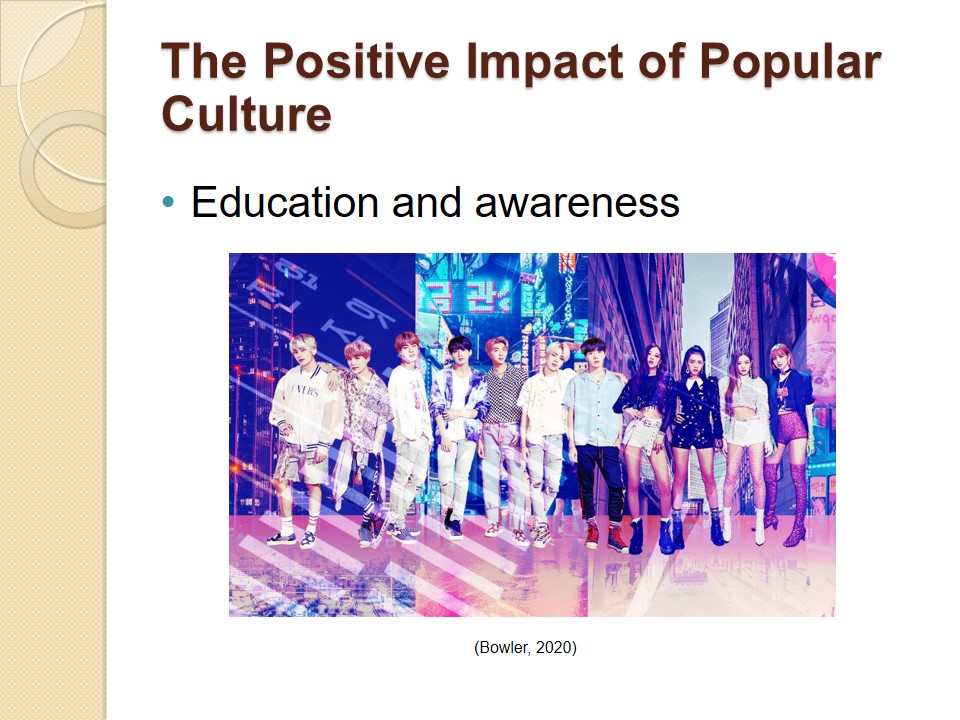
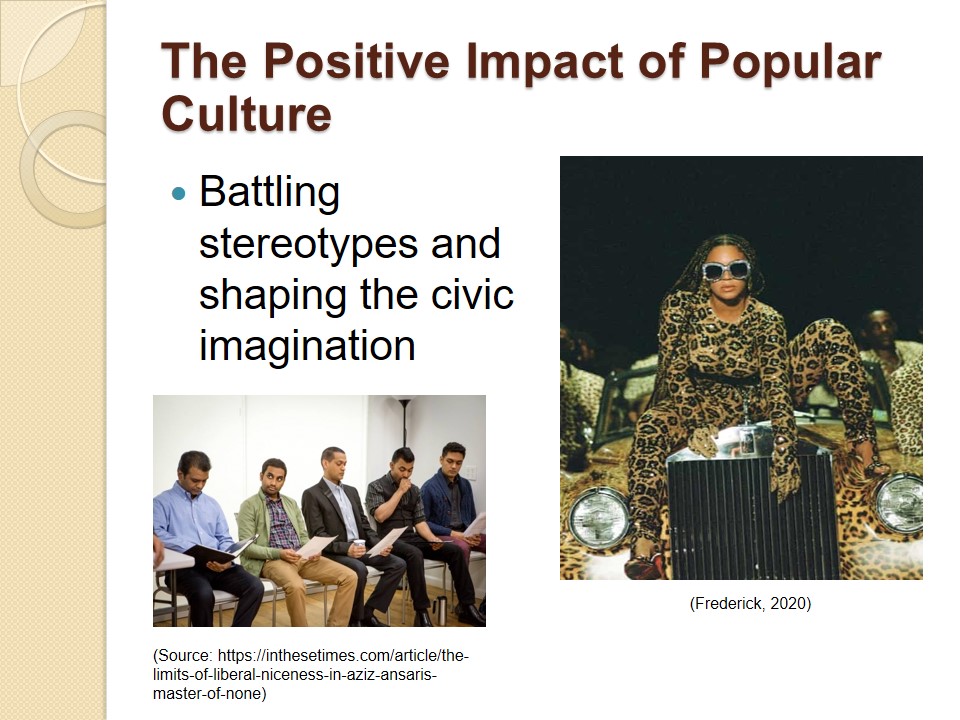
Conclusion
- Popular culture as reproduction – intercultural misunderstanding.
- Popular culture as an agent – intercultural communication.
Popular culture can have both negative and positive influence on intercultural communication. If creators continue to see it as a commodity and channel of reproducing accepted messages and popular values, it would continue to foster stereotypical representations of different cultures and lead to deeper conflicts. However, if popular culture becomes an agent of social change, it will establish new attitudes, raise awareness of various issues, and teach people how to communicate with each other more efficiently by educating about cultures in a sensitive way.
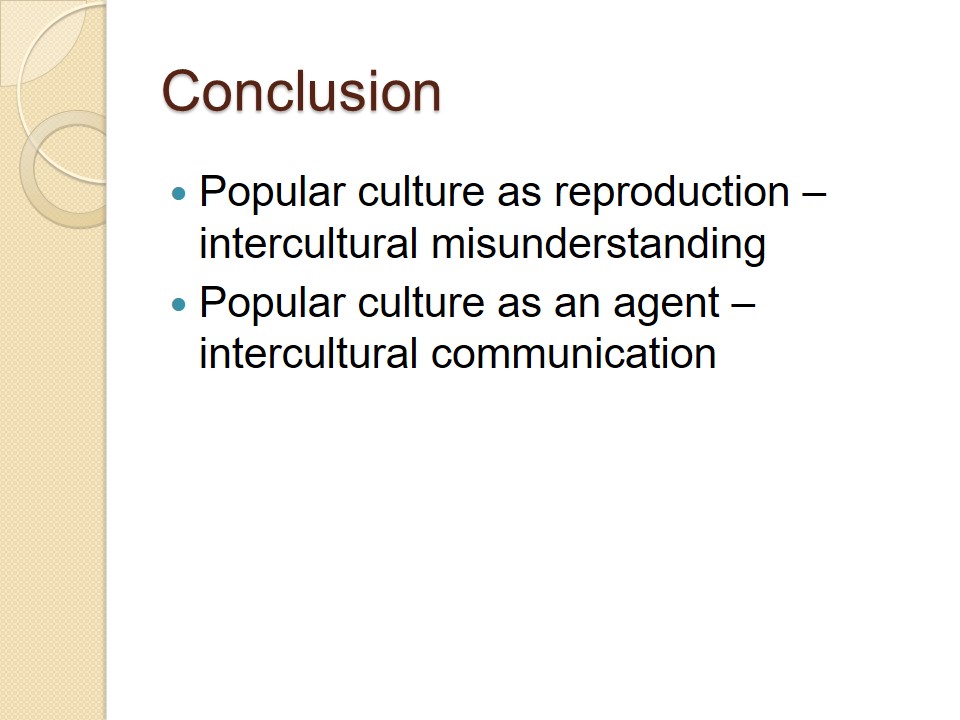
References
Baudinette, T. (2020). Consuming Japanese and Korean pop culture in Australia: “Asian literacy” and cosmopolitan identity. Journal of Australian Studies. Web.
Bowler, P. (2020). K-Pop: Everything you need to know about music’s most exciting scene. UDiscoverMusic. Web.
Frederick, C. (2020). Beyonce’s Black is King is a breathtaking celebration of black empowerment. The Guardian. Web.
Godsil, R.D., MacFarlane, J., & Sheppard B. (2016). #PopJustice: Volume 3: Pop culture, perceptions, and social change. Web.
Jenkins, H., Peters-Lazaro, G., & Shresthova, S. (eds). (2020). Popular culture and the civic imagination: Case studies of creative social change. New York, NY: New York University Press.
Leonard, K. (2019). Stereotypes in movies and how filmmakers can avoid them. Web.
McLean, S. (2018). Exploring interpersonal communication, Version 2.0. Boston, MA: FlatWorld Knowledge.
Retis, J., & Tsagarousianou, R. (2019). The handbook of diasporas, media, and culture. Hoboken, NJ: John Wiley & Sons.
Sun, R. (2018). “Crazy Rich Asians”: Read the letter that convinced Coldplay to allow “Yellow” in the movie. Hollywood Reporter. Web.
Sunkara, B. (2015). The limits of liberal niceness in Aziz Ansari’s Master of None. In These Times. Web.
That’s What She Had. (2019). Enough with the evil Russians! (Stranger Things made me write this). Web.